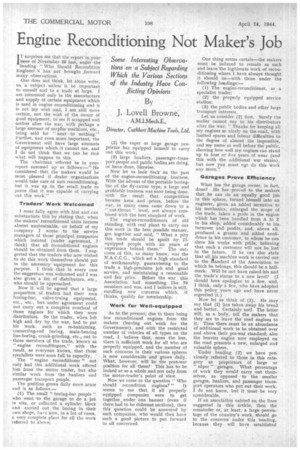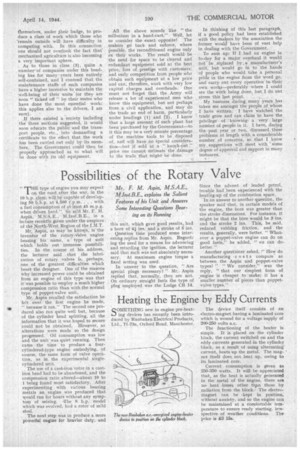Engine Reconditioning Not Maker's Job
Page 28

Page 31

If you've noticed an error in this article please click here to report it so we can fix it.
Some Interesting Observations on a Subject Regarding Which the Various Sections of the Industry Have Con Acting Opinions
By Lovell Browne,
A.M.1.Mech.E., Director, Cuthbert Machine Tools, Ltd. IT surprises me that the report in.your issue of November 26 last, under the heading "Who Sh.ould Recondition Engines?. 4 has. not brought ,forivard many. observations.
One does not think, let alone write, on a subject -unless it be important to oneself and to a trade at large. I am interested only in the manufacture and supply of certain equipment which is used in engine reconditioning and it is not my wish and, I .am still more certain, not the wish of the, owner of good equipment, to' see it scrapped, and useless after the war, with perhaps a large .amount of surprus machines, etc., being sold for " next to nothing." Further, and even more important, the Government will have large amounts of equipment .which it cannot use, and I do not think that, we can be sure what will happen to this.. .
The chairman referred to in your report summed up as follows:—" He considered that the makers would be most pleased if dealer organizations would take care of unit reconditioning. but it was up to theretail trade to prove that it was capable of carrying out this work."
Traders' Work Welcomed I most fully agree with him and can substantiate this by stating that, when the makers' reconditioned units became almost unobtainable, on behalf of my company I wroteto the service managers of those principalcompanies which insisted (under . agreement, I think) that all reconditioned engines should be obtained from them. I suggested that the traders who now wished to do this work themselves should put in the necessary equipment for this purpose. I think that in every case the suggestion was welcomed and I was also given a list of distributors, -etc., who should 'be approached.
Now it will be agreed that a large proportion of traders had their own boring-bar, valve-truing equipment, etc., etc., but under agreement could not carry out a complete overhaul of those engines for which they were distributors. So the trader, when left high and dry by the war, had to put his work, such as re-babbitting, connecting-rod boring, main-bearing line-boring, crank-grinding, etc., out to those members of the trade, known as "engine reconditicuters," with the result, as everyone knows, that those specialists were soon full to capacity. '
The " engine reconditioner " not only had this additional work offered him from the motor trader, but also similar work from the hauliers and passenger transport people.
The position grows daily more acute and is as follows.—
(I) The small " boring-bar people" who went to the garage to do a job in situ, or collected a cylinder block and carried out the boring in their own shops, haxe now, in a lot of cases, a very complete plant for all the work referred to above; ,
(2) the super or large garage proprietor has equipped himself to carry out this work; (3) large hauliers, passenger-transpore people and public bodies are doing, or have done, likewise.
Now let us look backon the past of the engine-reconditioning. business. With the advent of the portable boringbar of the fly-cutter type, a large and profitable business was soon being done, with the result, that competition became keen and prices, before the war, in many cases came down to a " cut-throat " level, not always combined with the best standard of work.
The engine-reconditioners of old standing, with real plant to carry out this work in the best possible manner, got together and said, "What a pity this trade should be spoilt by illequipped people with no ,years of experience behind them." The outcome of this, as many know, was the N.A.C.C.G., which set a high standard of workmanship, guaranteeing to the trade a high-precision job and good service, and maintaining a reasonable and fair price. Before the war this Association had. something like 70 members and was, and I believe is still, enrolling new concerns which, it thinks, qualify, for membership.
Work for Well-equipped
As to,the present; due to there being few reconditioned engines from the makers (leaving out work for the Government), and with the restricted number of vehicles of all types on the road,. I believe that, none the less, there is sufficient work for all who are properly equipped, and the number of such concerns in their various spheres is now considerable and grows daily. What, however, will be the post-war position for all these? This has to be looked at as a whole and not only from the motor-trader's point of view.
Now we come to the question "Who should recondition engines7 " It seems to me that if all properly equipped companies were to get together under one banner (even if there had to be different sections), then this question could be answered by such companies, who would then have such a good picture to put forward to all concerned.
One thing seems certain—the makers must be induced to remain as such and leave`the legitimate work of reconditioning where I hav always thought it should be—with those under the following headings:—
(1) The engine-reconditioner, as a specialist trader; (2) the properly equipped service station: (3) the public bodies and other large transport interests.
Let us consider (2) first. Surely the maker cannot say to his distributors after the war: " Thanks for keeping all my engines so nicely on the road, with limited spares and labour difficulties to the degree of almost the impossible, and my name so well before the public, showing how well my engines can stand up to four or five years of wear (and this with the additional war strain), but now you must nQt do this work any more..?
Garages Prove Efficiency What has the garage owner, in fact, done? He has 'proved to the makers that he can do an equally good job in this sphere, turned himself into an engineer, given an added incentive to his mechanics, enlarged the scope of the trade, taken a pride in the engine which has been handled from A to Z in his shop, added considerably to his turnover and profits, and, above all, produced a greater and added confidence in his customer, to whom he can show his works with pride, believing that such a customer will not be lost in the future. If he can also state that all his machine work is carried out to the Itandard of the Association to which he belongs, this should be a hallmark. Will he not have raised his and the trade's status to a new level? (I should here apologize to a few, and, I think, only a few, who have adopted this policy years ago and have never regretted it.)
Now let us think of (I). He may say that (2) has taken away his bread and butter. Certainly not! The latter will, as a body, tell the makers that they are to leave the used engines to it. Then there must be an abundance of additional work to be obtained over and above their pre-war standard; also the heavier engine now employed on the road presents a new, enlarged and
valuable sphere. .
Under heading (2) we have previously referred to those in this category as proprietors of large or " super" garages, What percentage of work they would carry out themseh-es, as opposed to the smaller garages, hauliers, and passenger transport operators who put out their work, I do not know, but it must be very considerable. • If an association existed on the lines suggested in this article, then the remainder or, at least, a large percentage of the country's work, should go to the concerns under this heading, because they will have established
themselves, under Jheir badge, to produce a class of work which those who -remain outside will have difficulty in competing with. In this connection one should not overlook the fact that' mechanized agriculture is also becoming a very important sphere.
• As to those in class (3), quite a number of companies under this heading has for many -years been entirely self-contained, and I contend that the maintenance staffs of such companies have a higher incentive to maintain the • well-being of their units' (or they are soon ticked off " by their mates who have done the most essential work; this applies also to the drivers, I am sure).
If there existed a society including the' three sections suggested, it would soon educate the public 'and the transport people, etc., into demanding a certificate to the effect that the work has been carried out only by its members. The Government could then be properly approached as to what will be done with its old equipment. All the above sounds like " the millenium in a hand-cart." Well, let us consider the exact opposite! The makers go back and enforce, where Possible,' the reconditioned engine only ,ex their works. The result would be the need for space to be cleared and redundant equipment sold at the best price, foss of prestige with customers; and early competition from people who obtain such equipment at a low price and can, therefore, work with very low capital charges and overheads. One must not forget that the Army will release a lot of experienced men who know this equipment, but not perhaps from a civil application, and may do the trade no end of harm, particularly under headings ( 1 ) and (2). I know that a large amount of such plant has been purchased by the Government—to it this may be a very minute percentage of the machine tools to be dispOsed of, and will have no special considera tion—but if sold at " knock-out " price one cannot estimate the damage to the trade that might be done.
In thinking of this last paragraph, if a good policy had been established with the makers by the association the former woubi have been. of vast help in dealing with the Government.
To sum up; If I had an engine in to-day for a major overhaul it would not be replaced by..a manufacturer's unit, but would go in to the hands of people who would take a personal pride in the engine from the word go, and carry out every operation in their own works—preferably where I could see the work' being done, but I do 'Mit
stress this last point.. ".
My business during many years has • taken are amongst the people of whom I have written. I have watched the trade grow and can claim to have the privilege of knowing. a 'very large number of people in it. I have, during the past year or two, discussed, these problems at 'length with a considerable number: of concerns, so that I know' nip, suggestions will meet with some degree of approval and support in many
instances.




















































